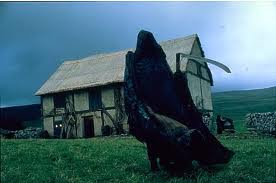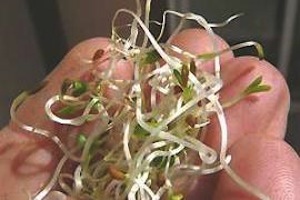The Aug/Sept. issue of Food Quality magazine contains a package of articles about lessons learned from this year’s E. coli O104 outbreak in Germany linked to raw sprouts grown from seeds produced in Egypt.
My own contribution was an attempt, at the editor’s request, to capture the uncertainty and vagaries that characterize outbreaks of food- or waterborne illness.
My friend Jim called on a Friday afternoon. Jim is a dairy farmer located on the edge of a town in Ontario, Canada, called Walkerton, and he said a lot of people were .jpg) getting sick. The community knew there was a problem several days before health types went public.
getting sick. The community knew there was a problem several days before health types went public.
On Sunday, May 21, 2000, at 1:30 p.m., the Grey Bruce Health Unit in Owen Sound, Ontario posted a notice on its website to hospitals and physicians to make them aware of a boil water advisory and inform them that a suspected agent in the increase of diarrheal cases was E. coli O157:H7.
There had been a marked increase in illness in the town of about 5,000 people, and many were already saying the water was suspect. But because the first public announcement was also the Sunday of the Victoria Day long weekend, it received scant media coverage.
It wasn’t until Monday evening that local television and radio began reporting illnesses, stating that at least 300 people in Walkerton were ill.
At 11 a.m. on Tuesday, May 23, the Walkerton hospital held a media conference jointly with the health unit to inform the public of the outbreak, to make people aware of the potential complications of the E. coli O157:H7 infection, and to warn them to take the necessary precautions. This generated a print report in the local paper the next day, which was picked up by the national wire service Tuesday evening, and subsequently appeared in papers across Canada on May 24.
These public outreach efforts were neither speedy nor sufficient. Ultimately, 2,300 people were sickened and seven died—in a town of 5,000. All the gory details and mistakes and steps for improvement were outlined in the report of the Walkerton inquiry
(www.attorneygeneral.jus.gov.on.ca/english/about/pubs/walkerton).
The E. coli O157:H7 was thought to have originated on a farm owned by a veterinarian and his family at the edge of town, someone my friend Jim knew well, a cow-calf operation that was the poster farm for Environmental Farm Plans. Heavy rains washed cattle manure into a long abandoned well-head, which was apparently still connected to the municipal system. The brothers in charge of the municipal water system for Walkerton, who were found to have been adding chlorine based on smell rather than something minimally scientific like test strips, were criminally convicted.
But the government-mandated reports don’t capture the day-to-day drama and stress that people like my friend experienced. Jim and his family knew many of the sick and dead. This was a small community. News organizations from around the province .jpg) descended on Walkerton for weeks. They had their own helicopters, but the worst was the medical helicopters flying patients with hemolytic uremic syndrome to the hospital in London. Every time Jim saw one of those, he wondered if it was someone he knew.
descended on Walkerton for weeks. They had their own helicopters, but the worst was the medical helicopters flying patients with hemolytic uremic syndrome to the hospital in London. Every time Jim saw one of those, he wondered if it was someone he knew.
I’m not an epidemiologist, but as a scientist and journalist with 20 years of contacts, I usually find out when something is going on in the world of foodborne outbreaks.
The uncertainties in any outbreak are enormous, and the pressures to get it right when going public are tremendous.
The public health folks in Walkerton may have been slow by a couple of days while piecing together the puzzle; what happened in Germany this summer in the sprout-related outbreak of E. coli O104, a relative of O157, was a travesty.
Worse, bureaucrats seemed more concerned about the fate of farmers than that of citizens. By at least one count, 53 have died, and more than 4,200 have been sickened.
Raw sprouts are one of the few foods I won’t eat, and as many epidemiologists have pointed out, sprouts top the list of any investigation involving foodborne illness.
We at bites count at least 55 outbreaks related to raw sprouts beginning in the U.K. in 1988, sickening thousands.
The first consumer warning about sprouts was issued by the U.S. Centers for Disease Control and Prevention (CDC) in 1997. By July 9, 1999, the U.S. Food and Drug Administration (FDA) had advised all Americans to be aware of the risks associated with eating raw sprouts. Consumers were informed that the best way to control the risk was to not eat raw sprouts. The FDA stated that it would monitor the situation and take any further actions required to protect consumers.
At the time, several Canadian media accounts depicted the U.S. response as panic, quoting Health Canada officials as saying that, while perhaps some were at risk, sprouts were generally a low-risk product.
That attitude changed in late 2005, as I was flying back to reunite with a girl I had met in Kansas and 750 people in Ontario became sick from eating raw bean sprouts.
Unfortunately, what food safety types think passes for common knowledge—don’t eat raw sprouts—barely registers as public knowledge. It’s hard to compete against food porn.
Sprouts present a special food safety challenge because the way they are grown, with high moisture at high temperature, also happens to be an ideal environment for bacterial growth.
Because of continued outbreaks, the sprout industry, regulatory agencies, and the academic community in the U.S. pooled their efforts in the late 1990s to improve the .jpg) safety of the product, implementing good manufacturing practices, establishing guidelines for safe sprout production, and beginning chemical disinfection of seeds prior to sprouting.
safety of the product, implementing good manufacturing practices, establishing guidelines for safe sprout production, and beginning chemical disinfection of seeds prior to sprouting.
But are such guidelines being followed? And is anyone checking?
Doubtful.
This was demonstrated by two sprout-related outbreaks earlier this year linked to sandwiches served by Jimmy John’s, a chain of gourmet sandwich shops based in Champaign, Ill.
Sprouts served on Jimmy John’s sandwiches supplied by a farm called Tiny Greens sickened 140 people with Salmonella, primarily in Indiana. In January, Jimmy John’s owner Jimmy John Liautaud said his restaurants would replace alfalfa sprouts, effective immediately, with allegedly easier-to-clean clover sprouts. This was one week after a separate outbreak of Salmonella sickened eight people in the U.S. Northwest who had eaten at a Jimmy John’s that used clover sprouts.
If the head of a national franchise is that clueless about food safety, can we really expect more from others?
Sprout grower Bill Bagby, who owns Tiny Greens Sprout Farm, said in the context of the German outbreak that, for many like him, the nutritional benefits outweigh the risk:
“Sprouts are kind of a magical thing. That’s why I would advise people to only buy sprouts from someone who has a (food safety) program in place (that includes outside auditors). We did not have (independent auditors) for about one year, and that was the time the problems happened. The FDA determined that unsanitary conditions could have been a potential source of cross-contamination and so we have made a lot of changes since then.”
Independent auditors? Like the ones who said everything was cool, everything was OK, at Peanut Corporation of America (nine dead, 700 sick in 2008-09) and Wright County Egg (2,000 sick in 2010)?
Like the Walkerton E. coli O157:H7 outbreak in 2000, too many are using the filters of their politics to advance their own causes and saying too many dumb things in light of the sprout outbreak of 2011.
It’s really about biology and paying attention to food safety basics—no matter how much that interferes with personal politics.
Thurs. Oct. 13, 2011 in 407 Trotter Hall, in the College of Veterinary Medicine at Kansas State University. My team will be on-hand to record the talk and, technology willing, throw it up on the web.

 epidemic for the first time."
epidemic for the first time.".jpeg) died of the disease.
died of the disease.
 reptiles were kept. Although direct contact between child and reptile was denied, other forms of reptile contact were reported in some cases. Identical Salmonella Tennessee strains of child and reptile kept in the same household could be shown in 2 cases.
reptiles were kept. Although direct contact between child and reptile was denied, other forms of reptile contact were reported in some cases. Identical Salmonella Tennessee strains of child and reptile kept in the same household could be shown in 2 cases..jpg) them acceptable.
them acceptable..jpg) getting sick. The community knew there was a problem several days before health types went public.
getting sick. The community knew there was a problem several days before health types went public..jpg) descended on Walkerton for weeks. They had their own helicopters, but the worst was the medical helicopters flying patients with hemolytic uremic syndrome to the hospital in London. Every time Jim saw one of those, he wondered if it was someone he knew.
descended on Walkerton for weeks. They had their own helicopters, but the worst was the medical helicopters flying patients with hemolytic uremic syndrome to the hospital in London. Every time Jim saw one of those, he wondered if it was someone he knew..jpg) safety of the product, implementing good manufacturing practices, establishing guidelines for safe sprout production, and beginning chemical disinfection of seeds prior to sprouting.
safety of the product, implementing good manufacturing practices, establishing guidelines for safe sprout production, and beginning chemical disinfection of seeds prior to sprouting..jpg) originate, when it appears most sprouters don’t know where their seeds originate.
originate, when it appears most sprouters don’t know where their seeds originate..jpg) widely distributed that no one really knows where they have gone or for how long they might remain for sale. One prediction, based on the probable package labeling, is that they could remain on shelves for 3 more years.
widely distributed that no one really knows where they have gone or for how long they might remain for sale. One prediction, based on the probable package labeling, is that they could remain on shelves for 3 more years..jpg) 16 other companies. One of those 16 broke its shipment up further, selling the seeds on to 70 additional companies: 54 in Germany, 16 in 11 other countries within the EU.
16 other companies. One of those 16 broke its shipment up further, selling the seeds on to 70 additional companies: 54 in Germany, 16 in 11 other countries within the EU. Germany and one focused around the French city of Bordeaux.
Germany and one focused around the French city of Bordeaux. .jpg) Egyptian fenugreek seeds exported in 2009 and 2010 may have been implicated in the outbreak were "completely untrue."??
Egyptian fenugreek seeds exported in 2009 and 2010 may have been implicated in the outbreak were "completely untrue."??.jpg) juices and individual dishes composed of white grapes, tomatoes, sesame seeds, chives, industrially produced soft cheese and fruit, the report said.
juices and individual dishes composed of white grapes, tomatoes, sesame seeds, chives, industrially produced soft cheese and fruit, the report said..jpeg) "during re-packaging cross-contamination cannot be excluded."
"during re-packaging cross-contamination cannot be excluded."